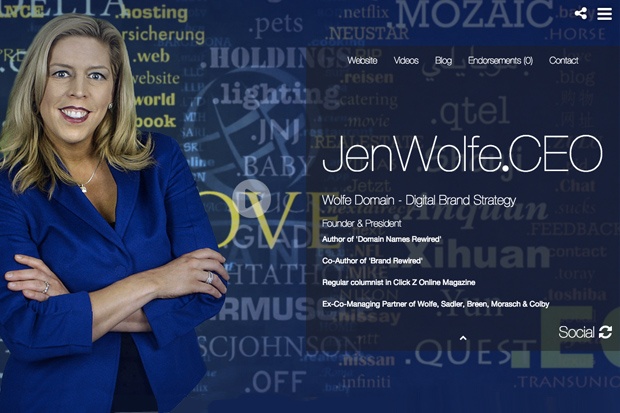Jen Wolfe started her own law firm when she was only 28 years old.
“It was the most terrifying and exciting experience”
People still used dial up email when Wolfe first spotted the opportunity to apply her intellectual property law specialty to the needs of brands developing a web presence.

To find new business, she sent a package of materials outlining her services to hundreds of local and national companies. She enticed the recipients to read the materials by including treats from Blue Chip Cookies, an early client. “Believe it or not, the packages would get through,” she says.
Today, Wolfe maintains her partnership interest in the legal practice in addition to her latest venture, Wolfe Domain, a digital brand strategy firm. Founded in 2012, Wolfe Domain advises Fortune 500 companies on building and protecting their brands in the next iterations of the Internet.
Wolfe also educates brands about how to navigate the new frontier of Generic Top-Level Domains or gTLDs. Up until 2014, there were only 23 gLTDs including dotCom, dotEdu and dotOrg. New gLTDs began rolling out last year, overseen by the nonprofit Internet Corporation for Assigned Names and Numbers (ICANN). According to ICANN, 583 new domains have been introduced to the Internet.
Wolfe has compiled her knowledge into two co-authored books, Brand Rewired and Domain Names Rewired. She discovered her love of writing early in her career. Tapping into her public relations and marketing background, she successfully pitched the Cincinnati Business Courier on her own legal advice column aimed at the business community.
To highlight the potential size and scope of the gTLD market, Google, along with 12 other companies including Amazon, all requested the dotApp domain. The rights went to auction, and Google spent $25 million for them in late February.
Brands can easily build out their domains to their specifications, track more analytics across their web pages and own the full rights to that naming convention.
Businesses that handle sensitive information, such as financial institutions, will benefit from gTLDs protection measures that counteract scams.
“American Express will be able to say that, if it doesn’t end in doxAMEX, don’t trust it,” says Wolfe.
“When they put out that kind of messaging, it becomes very visual for the consumer that only the institution can send dotAMEX emails.”
Wolfe believes that in the near future, both corporate and individual brands will use some kind of gTLD to define themselves online. CEOs, for example, can use dotCEO (as Wolfe already does - JenWolfe.CEO)
“With your own gTLD, you have an easier-to-remember domain name, complete control over the space and enhanced security,” she explains.
-

About Matt McCue
CEOs are Innovators: Jen Wolfe
CEOs are Innovators: Jen Wolfe
More Answers